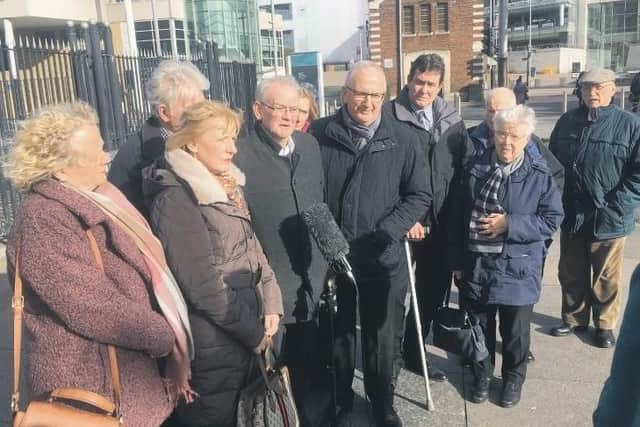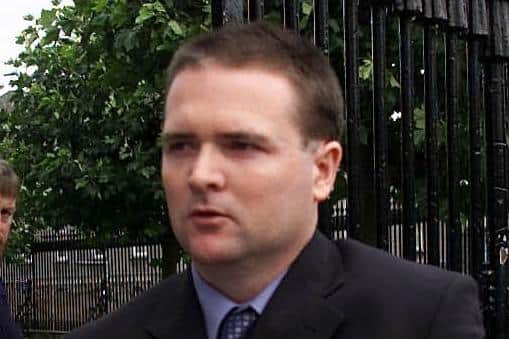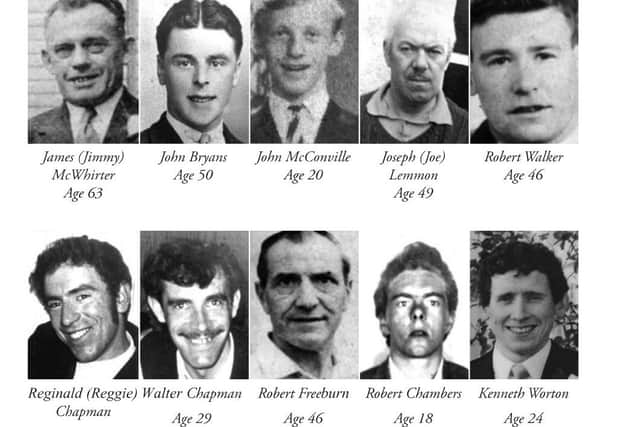Kingsmills Massacre by IRA: Four key issues not addressed in four hours of findings by legacy inquest
and live on Freeview channel 276
The legacy inquest - which began in 2014 - took ten years to investigate the massacre of 10 Protestant workmen by the IRA at Kingsmills in south Armagh in 1976.
In his findings, Coroner Brian Sherrard concluded that it was an “overtly sectarian attack by the IRA”. However Alan Black – who was shot 18 times and survived – called for a public inquiry, saying the decade-long process had been a “Band-Aid inquest”.
Advertisement
Hide AdAdvertisement
Hide AdThere were at least four significant events during the inquest which were either not addressed or only mentioned in passing in Friday's hearing:


1) Why did nine of the ten families of the deceased dramatically walk away in February 2020?
Their stated reason was that information on who was behind the murders was being withheld by the coroner.
At the last hearing before this, counsel for nine of the families said they had felt deeply disrespected at being repeatedly given key documentation with little notice before hearings.Their barrister Richard Smyth protested that they would not be cutting down the list of questions they wished to put to Garda about the attack.In 2011 the Historical Enquiries Team report concluded that the attack had been planned and executed from the south; the gunmen fled there afterwards; the getaway vehicle was stolen and dumped in the south; four weapons used were recovered there; the top three suspects had extensive terror records there and four suspects were questioned by Garda. The inquest also heard a key suspect was “a big man in the Provisional IRA in Dundalk”.
Advertisement
Hide AdAdvertisement
Hide AdMr Smyth said the families had been asked to cut down their questions to Garda about such matters because it had already answered some of them by correspondence. But he said there was no substitute for questions being put to a Garda officer in person, under oath.Coroner Brian Sherrard responded: “Ultimately these are my questions ... they will be asked in my name and they need to be framed in a proper manner”. He added: “This is my inquest and it is a matter for me as to how I direct it.”Mr Smyth also said the families were suffering “distress and frustration” over their desire to have codenames lifted for two IRA suspects who had been given On-The-Run letters. Mr Sherrard interrupted to ask why the families could not wait until the end of the inquest for his decision on the issue?But Mr Smyth replied that there had been “many examples” of inquests naming suspects who were still alive, and that BBC Spotlight had the night before named a number of key suspects.Mr Sherrard responded that naming deceased suspects was not simple due to matters of national security and the human rights of individuals who might be put at risk.At that point nine of the ten families walked out and cut all ties with the inquest. Several families have now said the inquest did not tell them anything new.


Yesterday the coroner service told the News Letter that it "cannot comment” on why this happened.
2) Why Alan Black spent his funeral money on a judicial review in a bid to press the coroner to name two deceased suspects?
In 2020 he took a judicial review to press the coroner to name two IRA suspects, one of them already named by BBC Spotlight. Mr Justice Scoffield reserved judgment on the challenge and urged Mr Black and the coroner to try to reach a "pragmatic" solution where a decision on naming them would be taken before the inquest ended. However, in advance of the hearing Mr Black told the News Letter he was angered to learn that the coroner would not be naming any suspects.
Advertisement
Hide AdAdvertisement
Hide Ad“It has been 10 wasted years of my life,” Mr Black told the News Letter.


The coroner service responded that the judicial review by Mr Black was “dismissed in the High Court".
3) Why a transcript of Garda answers to 77 questions from families was not published and why the families are legally forbidden from disclosing them?
The families had been pressing the Garda to provide evidence since 2014. Finally in 2023 Garda answered questions in a Dublin court – but families, their lawyers and the media were strictly barred by legislation laid down by the Irish government for the hearing. Alan Black said: “This was held in a hearing in secret away from us and our lawyers. We had no idea it was even taking place.” He is legally forbidden from disclosing a report on the Garda answers.
Advertisement
Hide AdAdvertisement
Hide AdThe Coroner responded that the evidence was disclosed "in full" to engaged lawyers and relatives and that "some" of it was referred to in his findings; the process for obtaining the transcript is in Irish legislation and out of the coroner's control, it added.
4) Why the witness statement from Ex-IRA man Vincent McKenna has not been disclosed to the public?
Mr McKenna gave a detailed statement in July last year, however it was not read in open court and the coroner has declined to release it to the News Letter. The coroner service responded that the statement was disclosed "in full" to engaged lawyers and families and is therefore "not secret". He added that all engaged lawyers agreed that there was no need to call McKenna to give oral evidence.